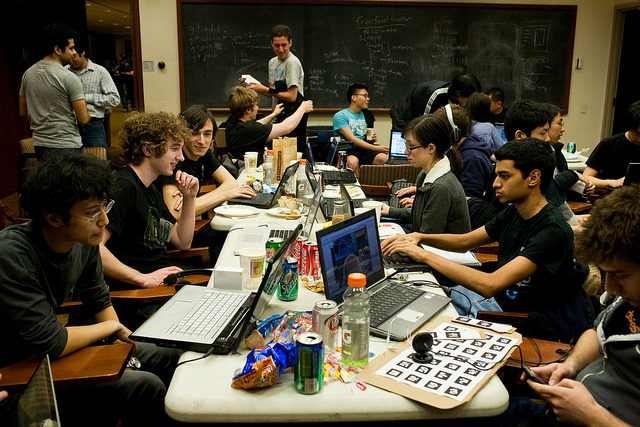
Four ideas for the future of hackathons
Photo Credit: Flickr user hackNY
Earlier this month as part of its Technology for Engagement Initiative, Knight Foundation gathered thought leaders to talk about the best ways to use new tools and platforms to bring communities together around important issues. During the summit, a group considered the future of hackathons. Three of the group’s participants, Eric Gordon, diector of the Engagement Game Lab at Emerson College, and Nigel Jacob and Chris Osgood, co-founders and co-chairs of the Boston Mayor’s Office of New Urban Mechanics, share their insights.
Perhaps no event in the young, Gov 2.0 movement has generated as much excitement, built as many connections, or led to as many alpha versions of apps as the hackathon. Often more sprint than marathon, these one day or one weekend development sessions have united developers around specific challenges, new data and the lure of pizza.
With a few years of hackathons in the rearview mirror, however, it is useful to reflect on how this platform for engagement and creation can be enhanced to better meet the challenges that cities and their citizens face today.
Too often, these hackathons have not led to solutions that address the biggest challenges of our day – issues such as the educational achievement gap, health disparities, and economic inequality. Too rarely have the good app ideas started through these sessions been taken across the finish line and sustained after the weekend has ended. And, too many of the leanings and too much of the code from these sessions is forgotten or not shared with a broader audience.
During the recent Knight Foundation summit on Technology for Engagement, a group of us considered how the hackathon could evolve to build off its success and address these concerns.
The conversation centered on the interest in shifting the hackathon away from developers building quick products in response to general guidance. Instead, hackathons could become opportunities for developers to learn about civic issues by engaging deeply with community groups and, in turn, enable community groups to learn about what’s possible in terms of technology by engaging with developers.
The group suggested four ways to advance that approach.
· Start With An Organization
Today, most hackathons start with a broad question (e.g. how do you improve transit ridership) and some applicable data sets (e.g. bus locations, train schedules, etc.) We believe if you want to solve the big problems of our day, you need to focus sharply on that from the start.
One approach to doing this is partnering with a local organization that is already deeply invested in a specific issue (e.g. boosting high school graduation rates.) In advance of the hackathon, work with that organization to craft a very specific design brief that articulates a particular hurdle that organization is facing in achieving its mission. Use that design brief as the focus point of the hackathon.
· Engage Teams of Developers
Hackathons are great ways for developers and community leaders to meet; however, because so much of the time may be consumed by individuals making connections, discovering strengths, and forming teams, too little time is spent on tackling the design challenge. One alternative would be for groups to form in advance and apply to be the one group of designers, developers and analysts that has the opportunity to participate in this effort.
· Build & Implement
Rather than a large group of people building prototype apps over one weekend, through this alternative approach, this one selected would focus on this one crafted design brief for 2-3 months, working with this one local organization. This would require more than pizza for the developers; it would require funding for the team as well as commitment from the local organization.
During that 2-3 month stint, however, the team could execute on a functioning product that could be implemented by the local organization and evaluated.
· Document & Share
At the conclusion of this 2-3 month stint, the organization and the team would have a functioning product which either could determine whether or not it would want to maintain or enhance; and, the team would have well-developed code and documented learnings it could share through platforms such as Civic Commons.
Have an idea for improving hackathons? Leave it in the comments section.
Related Tech For Engagement posts:
Creating a “manifesto” for the Tech For Engagement Community Gaming city planning: Community PlanIt in Detroit Narratives and gaming: design principles in civic engagement Friend your neighbor vs mowing her lawn: how technology can deepen engagement Beyond clicktivism: exploring ways technology can engage citizens in improving their communities
Recent Content
-
Communitiesarticle ·
-
Communitiesarticle ·
-
Communitiesarticle ·


